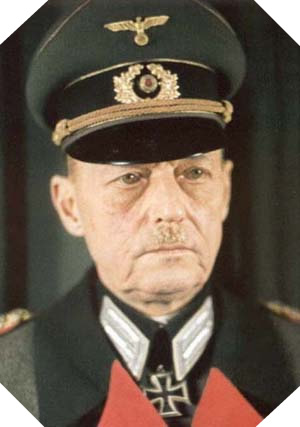
Karl Rudolf Gerd von Rundstedt
Biography
Karl Rudolf Gerd von Rundstedt was born in Aschersleben near Magdeburg (Germany) on December 12, 1875.
His father is a general and his brother a major: Karl, who is educated in a strict universe, enters various military schools, then enters the Prussian army in 1891.
He took part in the Battle of the Marne in 1914 within staff staff and alternated several commands on the western front and on the eastern front. At the end of the First World War, he was appointed Chief of Staff of the XVth German Army.
In August 1938, with a group of German generals, Gerd von Rundstedt opposed Hitler’s plan to invade Czechoslovakia.
In July 1940, he was named Feldmarschal and commander-in-chief of Western armies as part of the invasion of France. After his success in these operations in the west, he was sent to the Eastern Front in 1941.
Following the landing of Normandy on June 6, 1944, von Rundstedt was called to head the armies of the west. In the company of the general Rommel [/ postpermalink], he tries to persuade the Führer that a strategic withdrawal behind the Seine is necessary, and that it is necessary to call in reinforcement the German armies of the south of the France and place them on a line Seine-Switzerland but Hitler does not want to hear anything: German soldiers must defend their positions until death.
However, the German chiefs of staff know it, Rommel and von Rundstedt first: the capture of Cherbourg by the Allies on June 21, 1944 marks a turning point in the Battle of Normandy which announces a larger defeat for the Nazi Germany.
The German losses are far too high to hold the ground: at the end of June they amount to more than 50,000 prisoners and 300 tanks destroyed on 7 Panzerdivisions engaged.
On the evening of the first of July, Marshal Keitel and von Rundstedt talk on the phone about the meeting with Hitler in Berchtesgaden. Keitel asks him, « What to do? », Von Rundstedt replies, « Make peace, idiots, what else can you do? » Some time later, von Rundstedt was fired by the Führer, previously informed by Keitel.
Gerd von Rundstedt was immediately replaced by von Kluge, a German general with a great reputation.
On July 20, 1944, a bomb attack, organized by German generals, misses Hitler. Testimonies indicate that von Rundstedt is suspected of having participated in the organization of this attack, in particular because of the difference which opposed it with the Führer in Normandy. But he trusted him, and asked him to preside the court of honor of the German army, which is responsible for trying the military who participated in the preparation of the attack of 20 July. 55 officers are tried, and most of them are forced to commit suicide (like Rommel and von Kluge). The others are simply executed.
At the launch of Operation Market Garden in Holland, 1944, Hitler appealed to von Rundstedt to lead his armies against Allied troops, which he did. On January 1, 1945, in full battle of the Ardennes, the Germans launched the operation Nordwind, and von Rundstedt must pierce the front towards Antwerp. But American troops resist valiantly, and the offensive fails.
Removed from office in March 1945, he was arrested on 1 May by the US armed forces of the 36th Infantry Division. During his interrogation, he suffers from a heart attack and is immediately taken to England for treatment. Released in March 1948, he is not charged with the Nuremberg trial, but must remain at the disposal of justice for four years.
He died in Hanover in 1953.
![]() Back to the German military personnel biographies menu
Back to the German military personnel biographies menu
